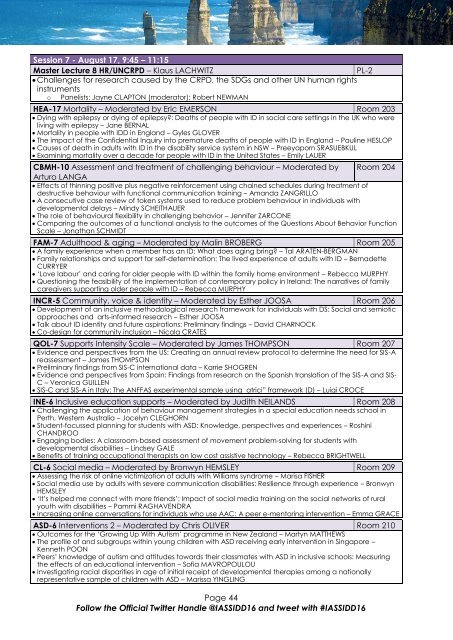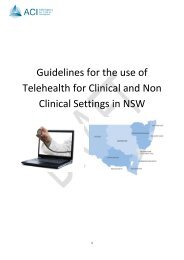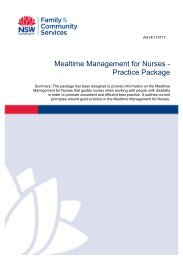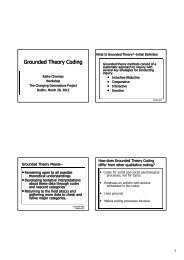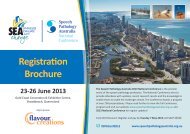Official Programme
ProgrammeBook_Final_25July2016
ProgrammeBook_Final_25July2016
Create successful ePaper yourself
Turn your PDF publications into a flip-book with our unique Google optimized e-Paper software.
DAILY SCHEDULES<br />
Session 7 - August 17, 9:45 – 11:15<br />
Master Lecture 8 HR/UNCRPD – Klaus LACHWITZ<br />
PL-2<br />
Challenges for research caused by the CRPD, the SDGs and other UN human rights<br />
instruments<br />
o Panelists: Jayne CLAPTON (moderator); Robert NEWMAN<br />
HEA-17 Mortality – Moderated by Eric EMERSON Room 203<br />
Dying with epilepsy or dying of epilepsy?: Deaths of people with ID in social care settings in the UK who were<br />
living with epilepsy – Jane BERNAL<br />
Mortality in people with IDD in England – Gyles GLOVER<br />
The impact of the Confidential Inquiry into premature deaths of people with ID in England – Pauline HESLOP<br />
Causes of death in adults with ID in the disability service system in NSW – Preeyaporn SRASUEBKUL<br />
Examining mortality over a decade for people with ID in the United States – Emily LAUER<br />
CBMH-10 Assessment and treatment of challenging behaviour – Moderated by Room 204<br />
Arturo LANGA<br />
Effects of thinning positive plus negative reinforcement using chained schedules during treatment of<br />
destructive behaviour with functional communication training – Amanda ZANGRILLO<br />
A consecutive case review of token systems used to reduce problem behaviour in individuals with<br />
developmental delays – Mindy SCHEITHAUER<br />
The role of behavioural flexibility in challenging behavior – Jennifer ZARCONE<br />
Comparing the outcomes of a functional analysis to the outcomes of the Questions About Behavior Function<br />
Scale – Jonathan SCHMIDT<br />
FAM-7 Adulthood & aging – Moderated by Malin BROBERG Room 205<br />
A family experience when a member has an ID: What does aging bring? – Tal ARATEN-BERGMAN<br />
Family relationships and support for self-determination: The lived experience of adults with ID – Bernadette<br />
CURRYER<br />
‘Love labour’ and caring for older people with ID within the family home environment – Rebecca MURPHY<br />
Questioning the feasibility of the implementation of contemporary policy in Ireland: The narratives of family<br />
caregivers supporting older people with ID – Rebecca MURPHY<br />
INCR-5 Community, voice & identity – Moderated by Esther JOOSA Room 206<br />
Development of an inclusive methodological research framework for individuals with DS: Social and semiotic<br />
approaches and arts-informed research – Esther JOOSA<br />
Talk about ID identity and future aspirations: Preliminary findings – David CHARNOCK<br />
Co-design for community inclusion – Nicola CRATES<br />
QOL-7 Supports Intensity Scale – Moderated by James THOMPSON Room 207<br />
Evidence and perspectives from the US: Creating an annual review protocol to determine the need for SIS-A<br />
reassessment – James THOMPSON<br />
Preliminary findings from SIS-C international data – Karrie SHOGREN<br />
Evidence and perspectives from Spain: Findings from research on the Spanish translation of the SIS-A and SIS-<br />
C – Veronica GUILLEN<br />
SIS-C and SIS-A in Italy: The ANFFAS experimental sample using atrici” framework (D) – Luigi CROCE<br />
INE-6 Inclusive education supports – Moderated by Judith NEILANDS Room 208<br />
Challenging the application of behaviour management strategies in a special education needs school in<br />
Perth, Western Australia – Jocelyn CLEGHORN<br />
Student-focussed planning for students with ASD: Knowledge, perspectives and experiences – Roshini<br />
CHANDROO<br />
Engaging bodies: A classroom-based assessment of movement problem-solving for students with<br />
developmental disabilities – Lindsey GALE<br />
Benefits of training occupational therapists on low cost assistive technology – Rebecca BRIGHTWELL<br />
CL-6 Social media – Moderated by Bronwyn HEMSLEY Room 209<br />
Assessing the risk of online victimization of adults with Williams syndrome – Marisa FISHER<br />
Social media use by adults with severe communication disabilities: Resilience through experience – Bronwyn<br />
HEMSLEY<br />
‘It’s helped me connect with more friends’: Impact of social media training on the social networks of rural<br />
youth with disabilities – Pammi RAGHAVENDRA<br />
Increasing online conversations for individuals who use AAC: A peer e-mentoring intervention – Emma GRACE<br />
ASD-6 Interventions 2 – Moderated by Chris OLIVER Room 210<br />
Outcomes for the ‘Growing Up With Autism’ programme in New Zealand – Martyn MATTHEWS<br />
The profile of and subgroups within young children with ASD receiving early intervention in Singapore –<br />
Kenneth POON<br />
Peers’ knowledge of autism and attitudes towards their classmates with ASD in inclusive schools: Measuring<br />
the effects of an educational intervention – Sofia MAVROPOULOU<br />
Investigating racial disparities in age of initial receipt of developmental therapies among a nationally<br />
representative sample of children with ASD – Marissa YINGLING<br />
Page 44<br />
Follow the <strong>Official</strong> Twitter Handle @IASSIDD16 and tweet with #IASSIDD16


